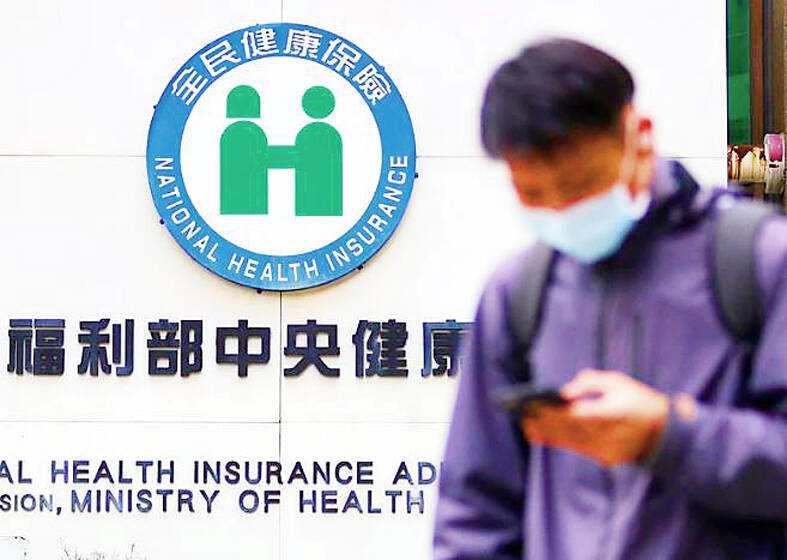People with two types of cancers who need treatment costing millions of New Taiwan dollars are now covered by the National Health Insurance (NHI) system.
From Nov. 1, people with B-cell acute lymphoblastic leukemia (B-ALL), one of the most common types of childhood cancer, or relapsed or refractory diffuse large B-cell lymphoma (DLBCL) are covered if they meet certain criteria, the National Health Insurance Administration (NHIA) announced last month.
The therapy for people with these cancers takes T cells and modifies them with chimeric antigen receptors (CARs) so that they can recognize and destroy cancer cells.

Photo: CNA
It costs about NT$8.19 million (US$253,537), said Huang Yu-wen (黃育文), director of the NHIA’s Medical Review and Pharmaceutical Benefits Division.
Given the cost, the NHIA has limited coverage to two types of cancer patients and a period of up to two years, but discussions are to be held to decide if the coverage should last longer, NHIA Director-General Shih Chung-liang (石崇良) said.
The Food and Drug Administration previously approved the use of CAR T cell therapy for all people with B-ALL aged 25 or under and for people with DLBCL whose cancers have relapsed or not responded to first or second-line treatments.
To be eligible for NHI coverage under the new program, people with B-ALL must be aged 25 or under, have leukemia that has not responded to other treatments, have relapsed after a bone marrow transplant or have had more than one relapse.
People with DLBCL are eligible for coverage if their cancer has recurred or not responded to treatments considered to be second-line or higher.
Huang Wei-han (黃威翰), deputy director of Hualien Tzu Chi Hospital’s Cell Therapy Center, said that 15 to 20 percent of young people with B-ALL have relapses, and only 30 to 50 percent of those who have relapses survive for five years.
About half of adult cases relapse, and only 10 percent of them survive for five years, he said.
Last year, a 10-year-old girl who had been battling B-ALL for more than four years became the first person in Taiwan to be successfully treated using CAR T cell therapy, Huang said.
Meanwhile, bone marrow transplants do not work for roughly half of all people with DLBCL, and those diagnosed with a cancer that has not responded to treatment or whose cancer has relapsed after a bone marrow transplant have only a 20 percent chance of surviving for two years, he said.
Huang Tai-chung (黃泰中), an attending hematology physician at National Taiwan University Hospital and secretary-general of the Hematology Society of Taiwan, said that 40 percent of people with DLBCL become completely cancer free after receiving CAR T cell treatment, while 13 percent are partially cured.
“Even if their cancer is only partially cured, it means a lot to the patients,” because it can help prepare them for the next stage of treatment, he said.
Sixty percent of people with B-ALL whose bone marrow transplants have failed can be completely cured with CAR T cell treatment, Huang Tai-chung said.
People can receive CAR T cell treatment at seven hospitals in Taiwan: National Taiwan University Hospital, National Taiwan University Cancer Center, Linkou Chang Gung Memorial Hospital, China Medical University Hospital, Taichung Veterans General Hospital, Kaohsiung Medical University Chung-Ho Memorial Hospital and Hualien Tzu Chi Hospital, Shih said.

Alain Robert, known as the "French Spider-Man," praised Alex Honnold as exceptionally well-prepared after the US climber completed a free solo ascent of Taipei 101 yesterday. Robert said Honnold's ascent of the 508m-tall skyscraper in just more than one-and-a-half hours without using safety ropes or equipment was a remarkable achievement. "This is my life," he said in an interview conducted in French, adding that he liked the feeling of being "on the edge of danger." The 63-year-old Frenchman climbed Taipei 101 using ropes in December 2004, taking about four hours to reach the top. On a one-to-10 scale of difficulty, Robert said Taipei 101

Nipah virus infection is to be officially listed as a category 5 notifiable infectious disease in Taiwan in March, while clinical treatment guidelines are being formulated, the Centers for Disease Control (CDC) said yesterday. With Nipah infections being reported in other countries and considering its relatively high fatality rate, the centers on Jan. 16 announced that it would be listed as a notifiable infectious disease to bolster the nation’s systematic early warning system and increase public awareness, the CDC said. Bangladesh reported four fatal cases last year in separate districts, with three linked to raw date palm sap consumption, CDC Epidemic Intelligence

US climber Alex Honnold left Taiwan this morning a day after completing a free-solo ascent of Taipei 101, a feat that drew cheers from onlookers and gained widespread international attention. Honnold yesterday scaled the 101-story skyscraper without a rope or safety harness. The climb — the highest urban free-solo ascent ever attempted — took just more than 90 minutes and was streamed live on Netflix. It was covered by major international news outlets including CNN, the New York Times, the Guardian and the Wall Street Journal. As Honnold prepared to leave Taiwan today, he attracted a crowd when he and his wife, Sanni,

Taiwanese and US defense groups are collaborating to introduce deployable, semi-autonomous manufacturing systems for drones and components in a boost to the nation’s supply chain resilience. Taiwan’s G-Tech Optroelectronics Corp subsidiary GTOC and the US’ Aerkomm Inc on Friday announced an agreement with fellow US-based Firestorm Lab to adopt the latter’s xCell, a technology featuring 3D printers fitted in 6.1m container units. The systems enable aerial platforms and parts to be produced in high volumes from dispersed nodes capable of rapid redeployment, to minimize the risk of enemy strikes and to meet field requirements, they said. Firestorm chief technology officer Ian Muceus said